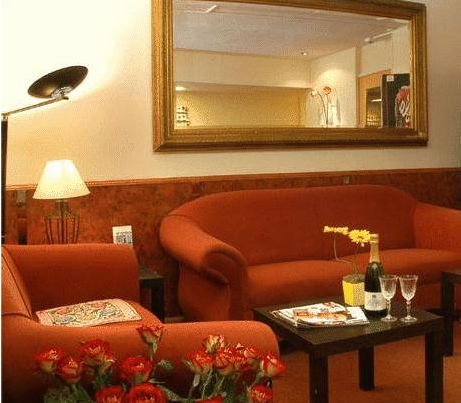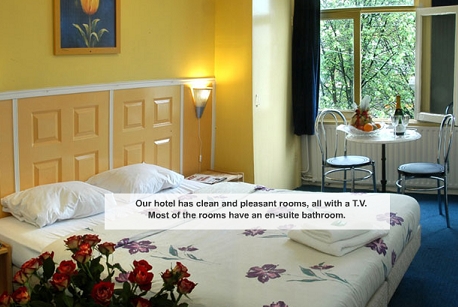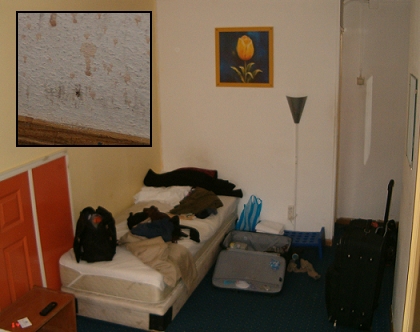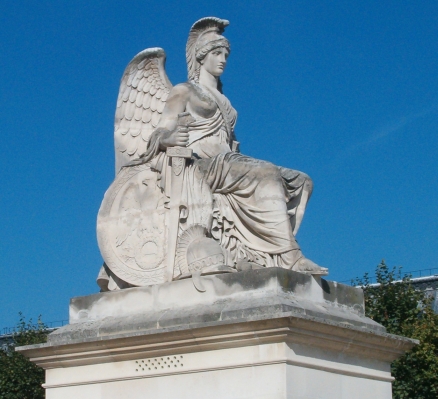A Review
The first sign of trouble was how hard it was to find. We were in Amsterdam, which was the right city. We were on Amstel, which was the right street. We were looking for number 60: Hotel Monopole. Finally, we spotted the tiny sign. Could that be the hotel? The exterior didn’t match what I was expecting.
We rolled our bulky suitcases across the cobblestone street to get a better look at the sign. The single door, which looked like the entrance to somebody’s apartment, had a small buzzer. I buzzed. “I have a reservation”, I explained. The door clicked open, revealing a steep and narrow set of stairs. We lurched upwards with our luggage. We had arrived at the Hotel Monopole.
I’d first found this underpriced gem in a travel book we took out from the library. I can’t remember what it said exactly, but I’m pretty sure the words “clean”, “comfortable” and “affordable” appeared in the short description. That’s what got Hotel Monopole on the short list of the hotels to look up on the Internet.
In hindsight, the fact that the word “demon” appears in their website address – http://www.monopole.demon.nl/ – should have given us a clue. But the website was beautiful. The pleasant photographs depicted an establishment of the highest comfort and quality.
 Classy. Elegant. Refined. It’s the Hotel Monopole, according to them.
Classy. Elegant. Refined. It’s the Hotel Monopole, according to them.
Because I had forgotten to write down the address of the hotel before arriving in Amsterdam, I had to call my aunt to ask her to look it up. She found their website easily. “Wow”, she remarked in her charming Dutch accent. “What a beautiful hotel! It must be very expensive. Why didn’t you stay in a hostel?”
“Nothing but the best for us”, I replied. My wife and I were both excited. After spending the previous few nights staying with our friends in Paris and then my cousin in Soest, a small Dutch town, Casie and I were looking forward to hotel accomodations. Especially when the rooms were as gorgeous as this:

Now, at last, we had arrived. We’d made it up the stairs and were checking in. The man behind the counter was friendly and professional while he recorded my credit card details. Our room key in hand, we staggered up yet another dangerous flight of stairs to our room:
 Not clean. Not pleasant. The Hotel Monopole, complete with wall closeup.
Not clean. Not pleasant. The Hotel Monopole, complete with wall closeup.
From this point on we faced a series of increasingly unpleasant revelations. We didn’t have a queen-sized bed or even a double – we had two single beds that we had to push together, which caused me to smash my elbow into the wood that separated them as I foolishly leapt into bed later that night. We had clean towels for the bathroom, but there was no place to hang them, which forced us to leave them on the floor. Thankfully though, the water in the shower was hot and strong. Hot and strong enough to dislodge large chunks of mildew from the bottom of the ancient shower curtain which swirled in the 3 inches of water around my feet as I showered the next morning.
 Not clean. Not pleasant. The bathroom of the Hotel Monopole, with shower curtain closeup.
Not clean. Not pleasant. The bathroom of the Hotel Monopole, with shower curtain closeup.
Of course, most of the problems with our room – and the hotel in general – were unknown to us when we first examined it. Not everything about our room was bad. We did have a nice view, for example, although all that really requires is a pane of glass that faces a certain direction. And in fact, we were about to find out that we were lucky to have the room we did.
Two friends of ours, Darren and Emma, were also staying in the Monopole. They are from Manchester and we had arranged to meet them that weekend. We’d agreed on the hotel after they saw the website. They had arrived the day before and after checking with the front desk, we found their room. It had its own little peculiarities, starting with the view.
Their large window looked out onto a singularly depressing scene: the asphalt rooftop of an adjacent building. Large ventilation pipes and fan boxes sprouted out everywhere. The entire rooftop was boxed in by brick walls so that, as Darren pointed out, if you jumped out of the window while fleeing fire, you’d have nowhere to go and would still burn to death. But that wasn’t the worst of it. They told us that they’d been up to 4 am the night before because of the pounding bass from a nightclub that sounded as if it was directly beneath their room.
“I cried me-self to sleep last night”, said Emma in her Manchester drawl. “Daz had to comfort me. I kept jerking awake in terror.”
They’d had trouble finding the hotel too, except in their case it was because there was a van parked in front when they came down the street. It wasn’t until it moved that they noticed the hotel. They were as surprised as us by what it was like. “You’ve really got to hand it to them,” said Darren, “this place looks absolutely nothing like the website. Maybe rooms that look so good on the site are actually where they live.”
That night the four of us resorted to the sleep-aid that never fails: large amounts of beer. When we returned to the hotel I paused in the hallway for a moment to listen to the pulsing bass coming from the rear of the building. It sounded pretty sweet: Boom Boom Boom ba-ba-Boom Boom Boom the bass rippled, growing softer as the dj got the crowd worked up: bow-badda-bow-badda-bow-badda-bow, then BA-BOOM BOOM BOOM BOOM at full volume. I could faintly hear the clubbers screaming their approval.
“Sleep tight”, I said to our friends. “Screw you”, they replied. From our room the bass was barely audible as I lay under the lank duvet. Single bed or not, at least I was warm, probably because I was still fully clothed. There was no top sheet on my bed and I was determined to allow as little skin as possible to touch the blanket. I drifted off to sleep, filled with the grudging admiration I always feel when I’m expertly ripped off. This would be home for the next two days.
 Classy. Elegant. Refined. It’s the Hotel Monopole, according to them.
Classy. Elegant. Refined. It’s the Hotel Monopole, according to them.
 Not clean. Not pleasant. The Hotel Monopole, complete with wall closeup.
Not clean. Not pleasant. The Hotel Monopole, complete with wall closeup. Not clean. Not pleasant. The bathroom of the Hotel Monopole, with shower curtain closeup.
Not clean. Not pleasant. The bathroom of the Hotel Monopole, with shower curtain closeup.
 twitter.com/adriandz
twitter.com/adriandz
